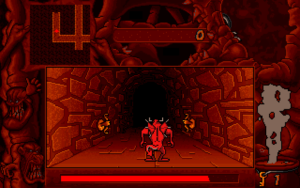Litil Divil
This blog has seen a request that I finish up Deus Ex next. I want you to know that I’m not ignoring it, but I have reasons to want to put it off for a little bit. In the meantime, let’s pull out something from the depths of the Stack.
 Litil Divil is a 1993 game by Gremlin Graphics, a studio otherwise unfamiliar to me, but which apparently had the resources to advertise this game noticeably in the videogame magazines of the day. It’s a game of cartoony pixel art and cartoony sensibilities. You play as a lesser devil called Mutt, possibly because of his enormous bulldog-like jowls, as he traverses the Labyrinth of Chaos to reach the overworld and retrieve a pizza. Please understand that most of this information, including the protagonist’s name, comes out of the manual rather than the game itself. The game has no intro other than Mutt dancing on the title screen. (Apparently some later ports add an animated FMV intro cutscene, which you can see on the game’s Steam page.)
Litil Divil is a 1993 game by Gremlin Graphics, a studio otherwise unfamiliar to me, but which apparently had the resources to advertise this game noticeably in the videogame magazines of the day. It’s a game of cartoony pixel art and cartoony sensibilities. You play as a lesser devil called Mutt, possibly because of his enormous bulldog-like jowls, as he traverses the Labyrinth of Chaos to reach the overworld and retrieve a pizza. Please understand that most of this information, including the protagonist’s name, comes out of the manual rather than the game itself. The game has no intro other than Mutt dancing on the title screen. (Apparently some later ports add an animated FMV intro cutscene, which you can see on the game’s Steam page.)
You could call it a “variety game”. The labyrinth proper is a series of largish grid mazes with occasional underpasses to make it harder to navigate. Some tunnels have doors to unlock or traps to dodge, but the real challenges come in the rooms scattered through the maze. Each room is a mini-game, which could be a puzzle, or a side-view fighting game, or an isometric platformer, or a shell game, or whatever else the designers came up with. All such challenges come without instructions; figuring out what you’re supposed to be doing, and what the controls do in that room, is just part of the challenge. Some challenges require inventory items obtained in other rooms, and this too is something you have to figure out on your own, usually by failing the challenge a few times.
Back in the mid-90s, this game was in rotation as something I’d pull out and try to finish from time to time, and I played it enough for a snippet of the background music — FM-synthesized, almost offensively jolly and lightly discordant — to get stuck in my head occasionally even to this day. (It’s always a little weird to hear music played aloud that you’ve only heard in your head for a long time. It never completely matches what you remember.) If I recall correctly, I got as far as the third maze, which could be the last one for all I know. There, I got severely stuck on a challenge involving a trampoline and could progress no further. I’m given to understand that it’s basically a timing thing, but I couldn’t seem to get the right timing no matter how many times I tried. The game’s low framerate definitely hurts timing-based puzzles.
I’m told that the MS-DOS version of this game is inferior to the Amiga CD32 version, but the MS-DOS version is what I have (and is what’s available through Steam and GOG). The CD32 has one feature that would make a significant difference to gameplay: the ability to rotate the camera 180° in the maze. In the version I’m playing, you can only change the camera facing at bends or intersections in the tunnel, which means that if you want to turn around, you have to go as far as the first such point and do a K-turn. Until then, you’re stuck doing the Crash Bandicoot thing, walking towards the camera with diminished visibility for any traps you’re approaching. This is an annoyance, but possibly a deliberate one, as annoyance is something of a theme. Mutt reacts with exasperation toward the player whenever he falls in a pit, and the manual cover features the tag line “And you thought you had a bad day!”
 Comments(1)
Comments(1)